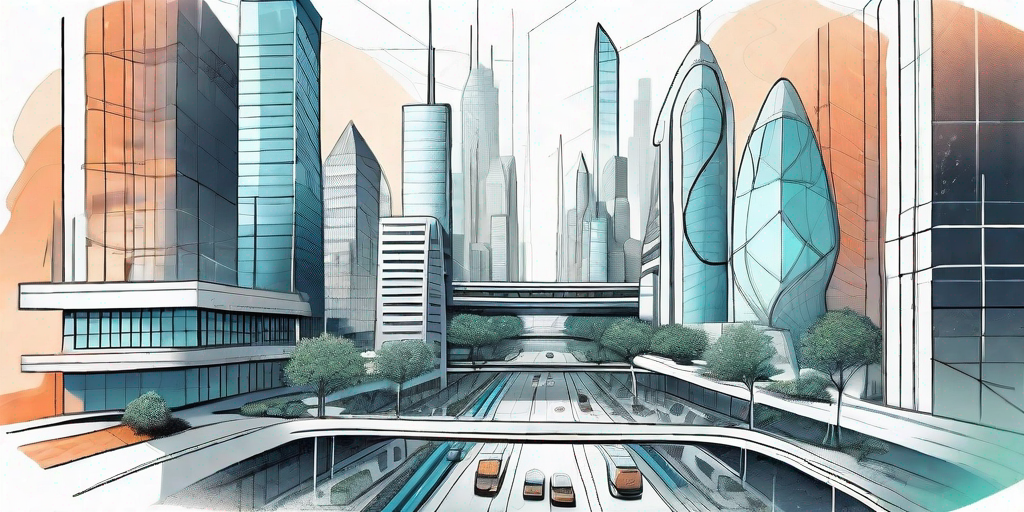Understanding Smart Cities Through a Futurist Speaker's Insight

Understanding Smart Cities Through a Futurist Speaker's Insight
The concept of smart cities is revolutionizing the way we live, work, and interact with our urban environments. With advancements in technology, the integration of data and connectivity is transforming cities into intelligent and efficient ecosystems. To delve into this fascinating topic, we turn to the insights of a futurist speaker — someone who possesses a unique ability to forecast trends, analyze societal shifts, and envision the possibilities of tomorrow.
Understanding the Concept of Smart Cities
Before we delve into the role of a futurist speaker in decoding smart cities, let's first establish a clear understanding of what exactly constitutes a smart city. A smart city is essentially a metropolis that employs advanced technologies to improve various aspects of urban life, including transportation, energy, healthcare, and sustainability. The goal is to enhance efficiency, reduce resource consumption, and enhance the quality of life for citizens.
Key elements of a smart city include the integration of interconnected sensors, intelligent infrastructure, and data analysis to facilitate the smooth operation of daily activities. For instance, smart transportation systems can optimize traffic flow, reduce congestion, and improve public transportation networks. Smart energy grids enable efficient allocation of resources, while smart healthcare innovations enhance patient care and ensure timely access to medical services.
By utilizing these cutting-edge technologies, smart cities aim to create a harmonious and sustainable environment that fosters innovation and enhances the overall well-being of their inhabitants.
One of the most significant benefits of smart cities is the improvement in transportation systems. With the integration of interconnected sensors and intelligent infrastructure, traffic flow can be optimized to reduce congestion and travel time. Imagine a city where traffic lights are synchronized based on real-time data, allowing for smoother traffic flow and fewer delays. Additionally, smart transportation systems can provide citizens with real-time information about public transportation schedules, helping them plan their journeys more efficiently.
Another crucial aspect of smart cities is the efficient allocation of resources, particularly in the energy sector. Smart energy grids enable the monitoring and control of energy consumption in real-time, allowing for better management of resources. For example, during periods of high demand, smart grids can automatically adjust energy distribution to ensure a stable supply without overloading the system. This not only reduces energy waste but also contributes to a more sustainable and environmentally friendly city.
In the healthcare sector, smart cities leverage technology to enhance patient care and improve access to medical services. Through the use of interconnected sensors and data analysis, healthcare providers can monitor patients remotely, allowing for early detection of potential health issues and timely intervention. Additionally, smart healthcare innovations enable patients to access medical services more conveniently, such as virtual consultations and remote monitoring of chronic conditions. This not only improves the overall quality of healthcare but also reduces the burden on healthcare facilities.
Overall, smart cities aim to create a seamless and sustainable environment that prioritizes the well-being of its citizens. By embracing advanced technologies and innovative solutions, these cities can enhance efficiency, reduce resource consumption, and improve the overall quality of life. As a futurist speaker, decoding the complexities of smart cities and exploring their potential becomes an essential task in envisioning a better future for urban living.
Role of a Futurist Speaker in Decoding Smart Cities
In the realm of smart cities, a futurist speaker plays a crucial role in interpreting and deciphering the complex evolution of urban landscapes. Armed with extensive knowledge of emerging trends and technologies, a futurist speaker offers a fresh perspective on the potential impacts and opportunities created by smart city initiatives.
Through engaging presentations, a futurist speaker not only educates audiences on the intricacies of smart cities but also challenges conventional thinking and stimulates critical analysis. By fusing their expertise in multiple disciplines, including technology, sociology, and urban planning, futurist speakers provide valuable insights on how smart cities can transform and benefit our societies.
Moreover, a futurist speaker offers a dynamic vision of the future, illustrating the countless possibilities that arise from the integration of technology and urban environments. Their ability to paint a vivid picture of what tomorrow could look like further inspires and motivates individuals and communities to embrace change and actively participate in shaping their cities.
One of the key aspects of a futurist speaker's role is to bridge the gap between technology and society. They understand that the success of smart city initiatives relies not only on the implementation of advanced technologies but also on the acceptance and engagement of the community. By highlighting the potential benefits and addressing concerns, a futurist speaker helps create a shared vision for the future of cities.
Furthermore, a futurist speaker delves into the social implications of smart cities, exploring how these technological advancements can improve the quality of life for citizens. They discuss the potential for increased efficiency in transportation, healthcare, energy consumption, and waste management. By examining case studies and real-life examples, futurist speakers demonstrate how smart city solutions have the power to create sustainable and inclusive communities.
In addition, a futurist speaker brings attention to the ethical considerations surrounding smart cities. They raise important questions about privacy, data security, and the potential for increased surveillance. By fostering discussions on these topics, futurist speakers encourage policymakers, industry leaders, and citizens to develop responsible and transparent approaches to the implementation of smart city technologies.
Moreover, a futurist speaker explores the economic impact of smart cities, shedding light on the potential for job creation, entrepreneurship, and economic growth. They discuss how the integration of technology can attract investment, foster innovation, and create new business opportunities. By showcasing successful smart city projects from around the world, futurist speakers inspire cities to embrace the digital transformation and position themselves as leaders in the global economy.
Lastly, a futurist speaker emphasizes the importance of collaboration and citizen engagement in the development of smart cities. They highlight the need for open dialogue between government, businesses, academia, and the public to ensure that smart city initiatives are inclusive, equitable, and sustainable. By encouraging active participation and empowering individuals to contribute their ideas and expertise, futurist speakers foster a sense of ownership and collective responsibility in shaping the cities of the future.
Impact of Smart Cities on Urban Living
The impact of smart cities on urban living is vast and multifaceted. From enhancing sustainability to improving safety and accessibility, the transformative power of smart city initiatives is reshaping the way we experience and interact with our urban environments.
One of the primary benefits of smart cities is their potential to optimize resource allocation and reduce waste. By utilizing data analytics and automation, smart cities can intelligently manage energy consumption, water usage, and waste disposal. This not only leads to cost savings but also helps mitigate the environmental impact associated with urban living.
For example, in a smart city, sensors installed throughout the city can monitor energy usage in real-time. This data can then be analyzed to identify patterns and trends, allowing city officials to make informed decisions on energy allocation. By optimizing energy distribution, smart cities can reduce energy waste and lower carbon emissions, contributing to a more sustainable future.
Smart cities also pave the way for improved safety and security. Intelligent surveillance systems and real-time data analysis enable prompt responses to emergencies and enhance overall public safety. For instance, in a smart city, surveillance cameras equipped with artificial intelligence can detect suspicious activities and alert authorities immediately. This proactive approach to security helps prevent crimes and ensures a safer environment for residents.
Furthermore, smart transportation systems in smart cities reduce congestion, enhance commute experiences, and contribute to a more sustainable and efficient urban mobility landscape. Advanced technologies such as traffic management systems, smart parking solutions, and real-time public transportation updates help optimize traffic flow and reduce travel times.
Imagine a smart city where traffic lights are synchronized based on real-time traffic data, ensuring smooth traffic flow and minimizing wait times at intersections. Additionally, smart parking systems can guide drivers to available parking spots, reducing the time spent searching for parking and the associated congestion. These improvements not only enhance the daily commute for residents but also contribute to a greener and more sustainable urban environment.
Additionally, by leveraging connectivity and digital infrastructure, smart cities empower citizens to actively contribute to decision-making processes and community development. Through citizen engagement platforms, individuals can voice their opinions, report issues, and collaborate with local authorities to shape the future of their cities.
For instance, in a smart city, residents can participate in online forums and surveys to provide feedback on urban planning projects. This direct involvement allows citizens to have a say in decisions that affect their daily lives, fostering a sense of ownership and empowerment.
Moreover, smart cities enable efficient and transparent governance. By digitizing administrative processes and implementing e-governance solutions, smart cities streamline public services and make them more accessible to residents. Online portals and mobile applications provide convenient platforms for citizens to access government services, pay bills, and access information.
In conclusion, the impact of smart cities on urban living is far-reaching. From optimizing resource allocation and enhancing safety to empowering citizens and improving governance, smart city initiatives are revolutionizing the way we live in urban environments. As technology continues to advance, the potential for smart cities to create sustainable, efficient, and inclusive urban spaces is immense.
How a Futurist Speaker Projects the Evolution of Smart Cities
As technology continues to advance at an exponential rate, the evolution of smart cities is poised to transform urban landscapes even further. A futurist speaker plays a crucial role in projecting this evolution, offering insights into the trajectory and potential outcomes of smart city initiatives.
One key aspect that a futurist speaker highlights is the growing importance of data and analytics in driving smart city development. As the volume of data generated by urban environments increases, the ability to harness its potential becomes vital. Futurist speakers shed light on the innovative ways in which data can be harnessed and analyzed, ultimately shaping the decision-making processes of tomorrow's smart cities.
Furthermore, futurist speakers underline the importance of collaboration and cross-disciplinary approaches in smart city development. The integration of diverse perspectives, including academia, industry, and government, fosters innovation and ensures that smart cities address the needs and aspirations of all stakeholders. By encouraging dialogue and partnerships, futurist speakers contribute to the creation of holistic and inclusive smart city strategies.
Lastly, futurist speakers explore emerging technologies and their potential impact on smart cities. From the rise of artificial intelligence and the Internet of Things to the adoption of renewable energy solutions, futurist speakers paint a vivid picture of how these innovations will shape our urban landscapes.
Planning for the Future: Adapting to Smart Cities
As we embrace the concept of smart cities, it is crucial to plan for the future and proactively adapt to the changing urban landscape. A futurist speaker's insight provides valuable guidance in this endeavor, ensuring that individuals and communities are well-prepared for the opportunities and challenges that lie ahead.
By understanding the concept of smart cities and the role of a futurist speaker in decoding their complexities, we gain a deeper appreciation for the transformative power of this phenomenon. The impact of smart cities on urban living is set to revolutionize our cities and our lives, and it is through the insights of futurist speakers that we can navigate this exciting journey into the future.
Frequently Asked Questions
1. What is a smart city?
A smart city is a metropolis that utilizes advanced technologies to improve various aspects of urban life, such as transportation, energy, healthcare, and sustainability. It aims to enhance efficiency, reduce resource consumption, and improve the quality of life for citizens.
2. What is the role of a futurist speaker in decoding smart cities?
A futurist speaker plays a crucial role in interpreting and deciphering the complex evolution of smart cities. They offer insights into emerging trends and technologies, challenge conventional thinking, and stimulate critical analysis. They also bridge the gap between technology and society, highlighting the benefits, addressing concerns, and fostering responsible approaches to the implementation of smart city technologies.
3. What is the impact of smart cities on urban living?
Smart cities have a significant impact on urban living. They optimize resource allocation, reduce waste, enhance safety and security, improve transportation systems, empower citizens, and streamline governance. Smart cities revolutionize the way we experience and interact with our urban environments, creating sustainable, efficient, and inclusive spaces.
Contact a Futurist Speaker for your event
Ready to bring the future to your next event? Look no further than Dr. Mark van Rijmenam, a renowned futurist speaker with a unique ability to forecast trends and analyze societal shifts. With his extensive knowledge of smart cities and their transformative potential, Dr. van Rijmenam can provide valuable insights and inspire your audience to embrace the digital transformation. Whether you are planning a conference, seminar, or corporate event, contacting Dr. van Rijmenam is the first step towards an engaging and thought-provoking experience. Don't miss out on this opportunity to have a futurist speaker who truly understands the complexities of smart cities and can help shape a better future. Contact us now, and we will be in touch within 24 hours to discuss your event requirements and how Dr. Mark van Rijmenam can make it an unforgettable experience.
Thanks for your inquiry
We have sent you a copy of your request and we will be in touch within 24 hours on business days.
If you do not receive an email from us by then, please check your spam mailbox and whitelist email addresses from @thedigitalspeaker.com.
In the meantime, feel free to learn more about The Digital Speaker here.
Or read The Digital Speaker's latest articles here.





